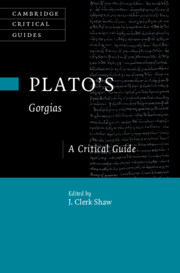Book contents
- Plato’s Gorgias
- Cambridge Critical Guides
- Plato’s Gorgias
- Copyright page
- Contents
- Contributors
- Abbreviations
- Introduction
- Chapter 1 Gorgias of Leontini and Plato’s Gorgias
- Chapter 2 Ancient Readers of the Gorgias
- Chapter 3 Philosophy and the Just Life in the Gorgias
- Chapter 4 Socrates and Coherent Desire (Gorgias 466a–468e)
- Chapter 5 The Ethical Function of the Gorgias’ Concluding Myth
- Chapter 6 Shame in the Gorgias
- Chapter 7 Desire and Argument in Plato’s Gorgias
- Chapter 8 Cooperation and the Search for Truth
- Chapter 9 Freedom, Pleonexia, and Persuasion in Plato’s Gorgias
- Chapter 10 Revealing Commitments
- Bibliography
- Index
- Cambridge Critical Guides
Chapter 10 - Revealing Commitments
Published online by Cambridge University Press: 25 May 2024
- Plato’s Gorgias
- Cambridge Critical Guides
- Plato’s Gorgias
- Copyright page
- Contents
- Contributors
- Abbreviations
- Introduction
- Chapter 1 Gorgias of Leontini and Plato’s Gorgias
- Chapter 2 Ancient Readers of the Gorgias
- Chapter 3 Philosophy and the Just Life in the Gorgias
- Chapter 4 Socrates and Coherent Desire (Gorgias 466a–468e)
- Chapter 5 The Ethical Function of the Gorgias’ Concluding Myth
- Chapter 6 Shame in the Gorgias
- Chapter 7 Desire and Argument in Plato’s Gorgias
- Chapter 8 Cooperation and the Search for Truth
- Chapter 9 Freedom, Pleonexia, and Persuasion in Plato’s Gorgias
- Chapter 10 Revealing Commitments
- Bibliography
- Index
- Cambridge Critical Guides
Summary
Plato’s Gorgias is often framed as a quarrel between rhetoric and philosophy, conceived as two ways of life. I suggest a refinement of the traditional framing: the dialogue requires discernment rather than choice. The reader must distinguish the real life from the illusory alternative, a task whose difficulty Plato intensifies by bringing to the fore the striking resemblances between rhetoric and philosophy. These resemblances lead to the realization that each side has a story about how it is the genuine article. Further, from a neutral vantage point, the dialogue leaves the two possibilities identically placed. In doing so, the Gorgias expresses a sense of the limitations of argument shorn of commitment to guiding normative principles. But Plato’s text also suggests the possibility of progress if, like Socrates, one is willing to stake one’s engagement on the presence of similar antecedent commitments within one’s interlocutor, however deeply rooted.
- Type
- Chapter
- Information
- Plato's GorgiasA Critical Guide, pp. 193 - 213Publisher: Cambridge University PressPrint publication year: 2024

